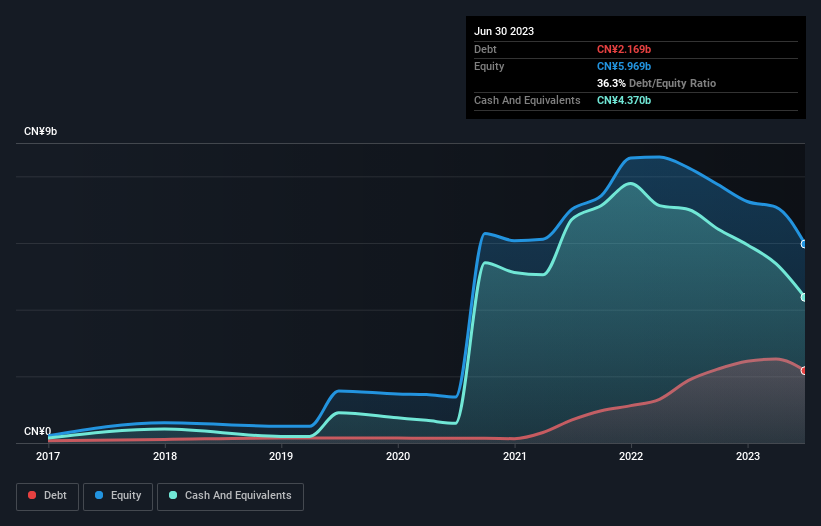CanSino Biologics (HKG:6185) Has Debt But No Earnings; Should You Worry?
Warren Buffett famously said, 'Volatility is far from synonymous with risk.' It's only natural to consider a company's balance sheet when you examine how risky it is, since debt is often involved when a business collapses. Importantly, CanSino Biologics Inc. (HKG:6185) does carry debt. But is this debt a concern to shareholders?
When Is Debt Dangerous?
Generally speaking, debt only becomes a real problem when a company can't easily pay it off, either by raising capital or with its own cash flow. In the worst case scenario, a company can go bankrupt if it cannot pay its creditors. However, a more common (but still painful) scenario is that it has to raise new equity capital at a low price, thus permanently diluting shareholders. Of course, the upside of debt is that it often represents cheap capital, especially when it replaces dilution in a company with the ability to reinvest at high rates of return. When we think about a company's use of debt, we first look at cash and debt together.
View our latest analysis for CanSino Biologics
What Is CanSino Biologics's Net Debt?
The image below, which you can click on for greater detail, shows that at June 2023 CanSino Biologics had debt of CN¥2.17b, up from CN¥1.88b in one year. However, its balance sheet shows it holds CN¥4.37b in cash, so it actually has CN¥2.20b net cash.

How Healthy Is CanSino Biologics' Balance Sheet?
We can see from the most recent balance sheet that CanSino Biologics had liabilities of CN¥2.72b falling due within a year, and liabilities of CN¥1.21b due beyond that. Offsetting these obligations, it had cash of CN¥4.37b as well as receivables valued at CN¥880.9m due within 12 months. So it can boast CN¥1.32b more liquid assets than total liabilities.
This short term liquidity is a sign that CanSino Biologics could probably pay off its debt with ease, as its balance sheet is far from stretched. Succinctly put, CanSino Biologics boasts net cash, so it's fair to say it does not have a heavy debt load! There's no doubt that we learn most about debt from the balance sheet. But it is future earnings, more than anything, that will determine CanSino Biologics's ability to maintain a healthy balance sheet going forward. So if you're focused on the future you can check out this free report showing analyst profit forecasts.
Over 12 months, CanSino Biologics made a loss at the EBIT level, and saw its revenue drop to CN¥431m, which is a fall of 85%. To be frank that doesn't bode well.
So How Risky Is CanSino Biologics?
By their very nature companies that are losing money are more risky than those with a long history of profitability. And in the last year CanSino Biologics had an earnings before interest and tax (EBIT) loss, truth be told. Indeed, in that time it burnt through CN¥2.3b of cash and made a loss of CN¥1.8b. But at least it has CN¥2.20b on the balance sheet to spend on growth, near-term. Even though its balance sheet seems sufficiently liquid, debt always makes us a little nervous if a company doesn't produce free cash flow regularly. There's no doubt that we learn most about debt from the balance sheet. However, not all investment risk resides within the balance sheet - far from it. For example, we've discovered 1 warning sign for CanSino Biologics that you should be aware of before investing here.
If you're interested in investing in businesses that can grow profits without the burden of debt, then check out this free list of growing businesses that have net cash on the balance sheet.
New: AI Stock Screener & Alerts
Our new AI Stock Screener scans the market every day to uncover opportunities.
• Dividend Powerhouses (3%+ Yield)
• Undervalued Small Caps with Insider Buying
• High growth Tech and AI Companies
Or build your own from over 50 metrics.
Have feedback on this article? Concerned about the content? Get in touch with us directly. Alternatively, email editorial-team (at) simplywallst.com.
This article by Simply Wall St is general in nature. We provide commentary based on historical data and analyst forecasts only using an unbiased methodology and our articles are not intended to be financial advice. It does not constitute a recommendation to buy or sell any stock, and does not take account of your objectives, or your financial situation. We aim to bring you long-term focused analysis driven by fundamental data. Note that our analysis may not factor in the latest price-sensitive company announcements or qualitative material. Simply Wall St has no position in any stocks mentioned.
About SEHK:6185
CanSino Biologics
Develops, manufactures, and commercializes vaccines in the People’s Republic of China.
High growth potential with adequate balance sheet.
Market Insights
Community Narratives




